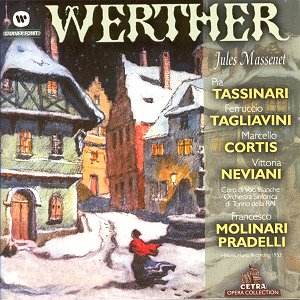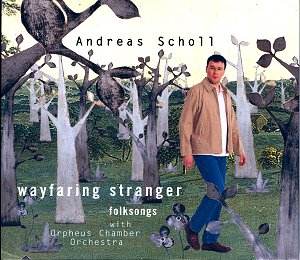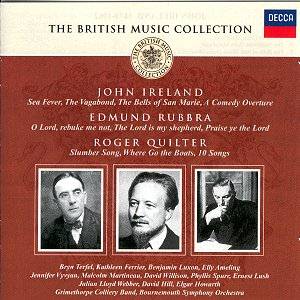 Composer: Jules Massenet
Composer: Jules Massenet
Works: Werther
Performers: Ferruccio Tagliavini (tenor), Pia Tassinari (mezzo soprano), Marcello Cortis (baritone), Vittoria Neviani (soprano), Guiliano Ferrein (bass), Tommaso Soley (tenor), Luigi Latinucci (baritone), Coro di Voci Bianche, Orchestra Sinfonica di Torino della RAI, Francesco Molinari Pradelli (conductor)
Recording: Recorded at Turin, 1953
Label: Warner Fonit 8573 87494-2
Massenet’s “Werther,” a work often overshadowed by its more famous contemporaries, embodies the lush romanticism of the late 19th century while drawing deeply from Goethe’s poignant tale of unrequited love. Premiered in 1892 in Vienna, the opera has maintained its allure through its evocative melodies and rich orchestration. This reissue of the 1953 Cetra recording, featuring a cast of Italian singers, presents a unique interpretation that diverges from the French stylistic norms often associated with the opera, yet offers a compelling glimpse into Massenet’s dramatic world.
Ferruccio Tagliavini’s portrayal of Werther is striking, his tenor voice displaying a blend of lyrical beauty and dramatic intensity. While his French pronunciation may border on idiosyncratic, it is his emotional engagement that ultimately captivates. Notably, in Act II, Scene III, Tagliavini’s voice rises to a powerful climax, showcasing not only his technical prowess but also the internal turmoil of the character. However, the Italianate flavor he brings may challenge purists expecting a more Gallic interpretation. Pia Tassinari, as Charlotte, offers a rich mezzo-soprano timbre that resonates with warmth, particularly in her poignant aria “Il faut nous séparer,” where her dark, velvety tones convey the depth of her character’s conflicting emotions. Tassinari’s passionate delivery in the Letter Scene juxtaposes beautifully with Tagliavini’s ardor, revealing the operatic landscape’s emotional complexities.
The supporting cast, including Marcello Cortis as Albert and Vittoria Neviani as Sophie, contributes to a performance that is both vivid and dramatically cohesive. While Cortis invests as much passion as the one-dimensional role allows, Neviani’s character feels more akin to an operatic foil, her trills and glimmers a contrast to the heavier emotional weight of the leads. The orchestration under Francesco Molinari Pradelli’s baton is a highlight, with a lushness that sometimes overshadows the vocal lines, particularly in the sensuous harp passages and the finely woven string textures. The orchestra’s interplay with the singers is a reminder of Massenet’s masterful orchestral writing, where instrumental color plays as significant a role as vocal lines.
Despite its vintage production, the recording quality captures the richness of the orchestral textures and the nuances of the singers’ performances, allowing listeners to appreciate the subtleties of Massenet’s score. The engineering may not possess the clarity of modern recordings, yet it carries a nostalgic charm that enhances the listening experience. The absence of extensive program notes in the CD booklet feels like a missed opportunity to provide context for contemporary listeners unfamiliar with Massenet’s oeuvre.
This reissue stands firm alongside more recent recordings featuring acclaimed artists like Plácido Domingo and Anna Caterina Antonacci, yet it offers a distinctive Italianate approach that may surprise those accustomed to more traditional interpretations. The Cetra set maintains its relevance, showcasing a performance that is both heartfelt and technically accomplished. Through the lush orchestral textures and the passionate vocal interpretations, this recording embraces Massenet’s vision while inviting listeners to experience the emotional depths of “Werther” anew. An essential listen for those seeking to understand the broader palette of operatic expression in the late Romantic period, this release underscores the enduring beauty of Massenet’s music.



